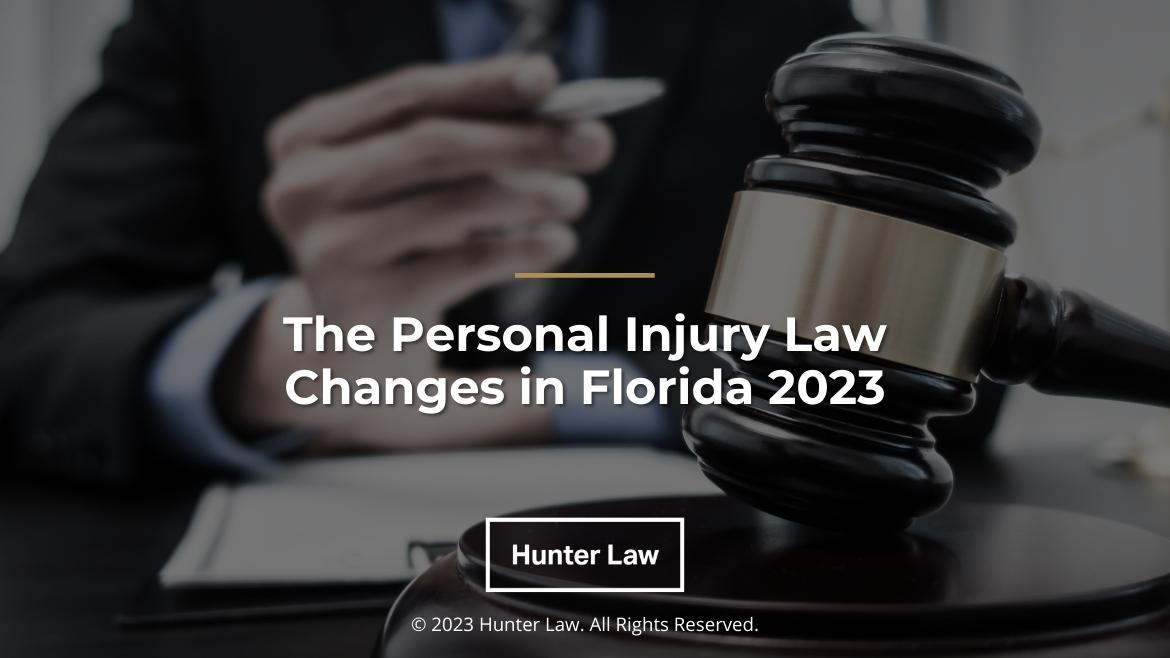2023 brought major shakeups to personal injury laws in Florida. Current Gov. Ron DeSantis signed several changes to the Florida Statute into law, requiring attorneys and future personal injury clients to take note. If you’re wondering how these personal injury law changes may affect your case, read on; we’ll break them down for you. Numerous changes in the law require the best personal injury lawyers in Tampa to help with your case. Hunter Law is here to help.
Personal Injury Statute of Limitations Reduction
First, the personal injury statute of limitations has been reduced to two years, down from four years. This might not seem like a big deal, but many personal injury claims have to go through a very long, highly investigative process. Having less time to gather evidence and present a claim puts more pressure on plaintiffs to decide to sue quickly.
In essence, you have two years to bring forth a personal injury claim against a defendant instead of four. Keep that in mind if you wish to file a legal claim against an at-fault party sometime in the near future. You’ll need to do so more rapidly than before.
Pure Comparative Negligence – Modified Comparative Negligence
Pure comparative negligence rules have also been changed. In a nutshell, the rules now follow modified comparative negligence guidelines. If a plaintiff is more than 50% at fault for their injuries compared to the defendant in a personal injury case, they can’t (usually) recover any damages from the defendant.
For example, if two individuals are involved in a Tampa auto accident, and the plaintiff in a lawsuit is deemed 51% responsible for the accident by the court, that plaintiff can’t recover compensation from the defendant.
This prevents plaintiffs from recovering any damages even when the defendant may have had significant responsibility in causing those damages. Under the old rules, a plaintiff could be found to be 60% at-fault but still recover 40% of their damages from the defendant. That is no longer the case.
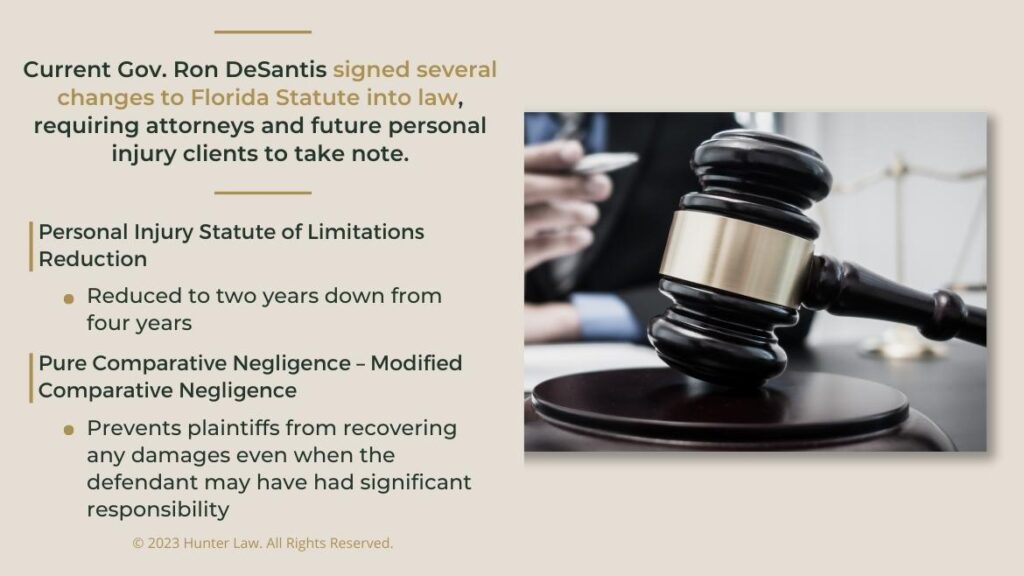
Health Insurance Reimbursement Effect’s on Medical Expenses
Compensation
Thanks to the recent legal changes, defendants in personal injury cases can use evidence of private health insurance reimbursement and Medicare/Medicaid rates to reduce how much a plaintiff says they have in terms of past and future medical expenses.
As most of us know, health insurance frequently carries high premiums. high deductibles and copays. Defendants can now present evidence of what private health insurance would pay for future medical expenses. This ignores the fact that just because a plaintiff has health insurance today doesn’t mean they will have it in the future.
Perhaps even more troubling, the bill lets a personal injury case defendant use the Medicare or Medicaid reimbursement rate if the plaintiff doesn’t have health insurance, even if the plaintiff does not qualify for Medicare or Medicaid. Medicare and Medicaid reimburse for medical procedures at a much lower rate than private health insurance.
This legislative change essentially creates two separate classes of plaintiffs entirely based on their health insurance status. This change will surely be challenged under the Florida and US Constitution.
Contact the Hunter Law team today – the best personal injury lawyers in Tampa – 813-287-2227
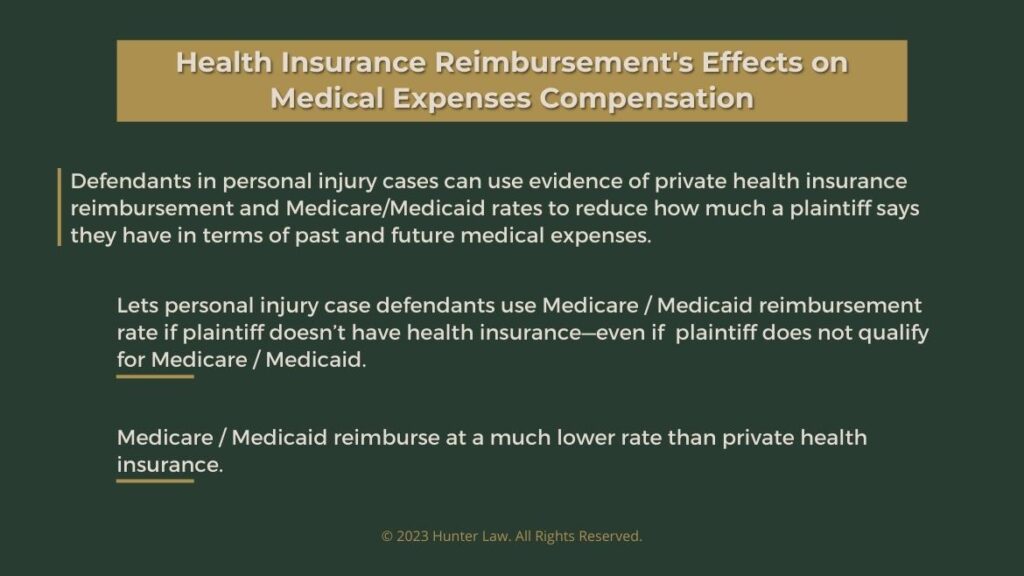
Reduction in Attorney Fee Awards
Attorney fees and costs were previously subject to various multipliers in personal injury cases. However, the Florida 2023 personal injury bill has now adopted the federal standard and eliminated attorney fee multipliers. This is potentially troubling as the potential for a fee multiplier in certain types of cases represented the only way some plaintiffs could find an attorney to take on their case.
Read more in our blog: Attorney Fees and Costs in Florida: What Changed in 2023?
Bad Faith Law Adjustments
According to the new personal injury laws, the bad faith legal framework for insurance claims has been adjusted. Now, negligence alone doesn’t mean there was bad faith on behalf of one party. A claimant for damages must also act in good faith when furnishing information to the court and settling an insurance claim.
Put another way, an insurance company needs to be specifically shown to be mishandling claims as a business practice to be liable for further damages. Accidental mishandling or negligence isn’t sufficient for successful claims any longer.
In addition, insurers can limit bad-faith liability if multiple claimants are involved in a single legal action. They can do this by paying the total policy amount before settlement negotiations start.
This is one of the most troubling changes, as the potential for bad-faith liability was often the only thing keeping an insurance company honest in its claims handling. Reducing or completely removing the potential for bad-faith is almost certain to lead to more predatory and unfair claims handling by insurers.
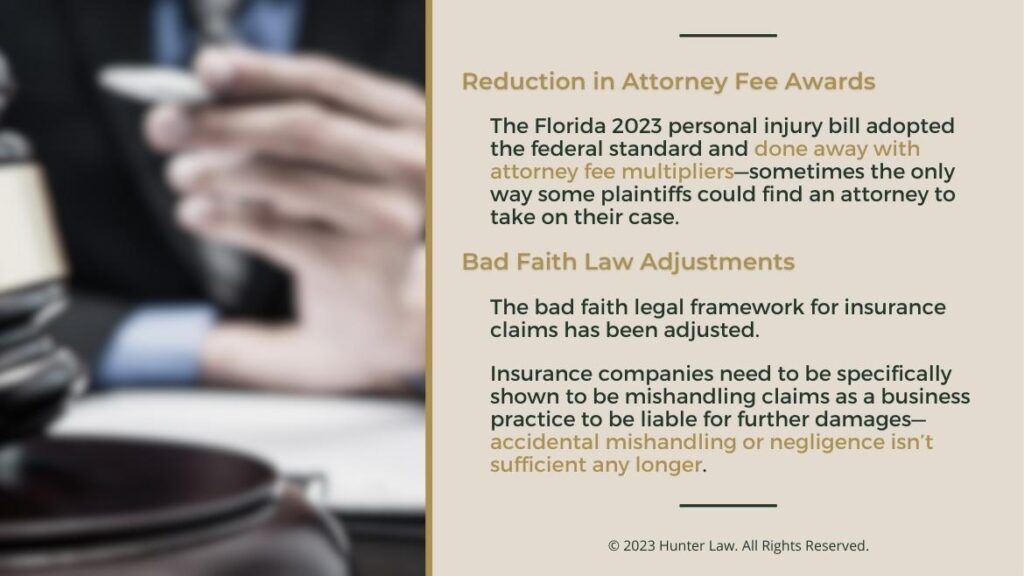
Letter of Protection Disclosure Requirements
One of the biggest changes in the 2023 personal injury law bill was the new requirement of a Letter of Protection disclosure. A Letter of Protection in Florida is an agreement between medical providers and patients to wait to pay a bill using the proceeds of a legal settlement. It is often used because most plaintiffs cannot afford to pay for the treatment without a settlement, especially if they are injured so severely that they cannot work. Now, the law requires a plaintiff and their doctor to disclose the presence of a Letter of Protection.
Furthermore, the bill has eliminated the attorney-client privilege normally present if a lawyer refers a client to a doctor.
This is extremely troubling because the attorney-client privilege is sacred and should not be violated under almost any circumstance. Additionally, many doctors will not deal with personal injury cases to begin with. That list will continue to grow with the changes to the law. It can be difficult for a plaintiff to find an experienced and effective doctor and now the legislature has tried to put another roadblock in that process.
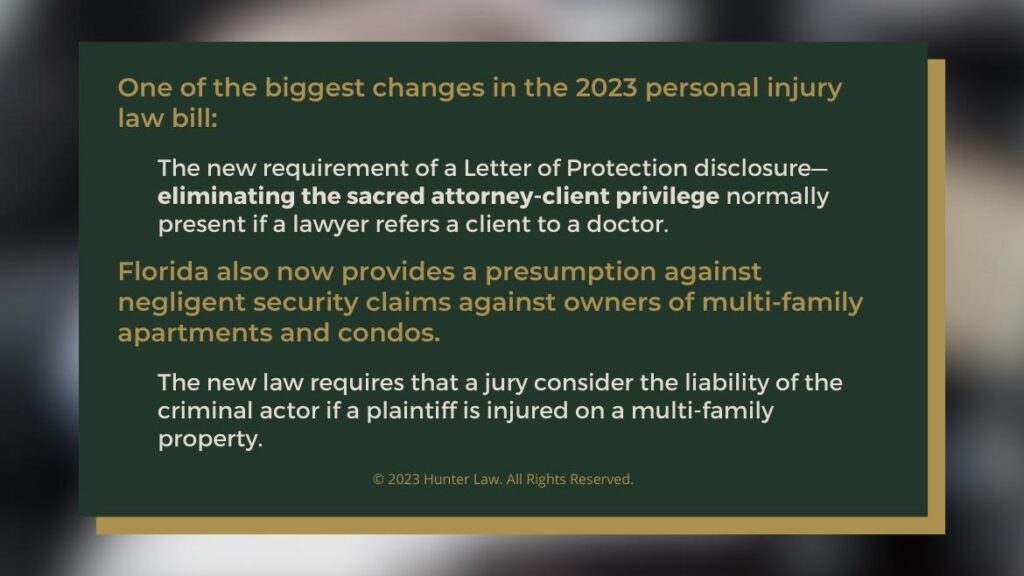
Presumption Against Negligence for Multi-Family Apartments and Condos
Florida law now provides a presumption against negligent security claims against owners of multi-family apartments and condos. To qualify for the presumption, the owner of a multi-family residential would need to do the following:
- Have security camera system that faces every entrance and exit with at least 30 days of recorded footage;
- Have a lighted parking lot illuminated at an intensity of at least an average 1.8 foot-candles per square foot at 18 inches above the surface from dusk until dawn;
- Have well-lit walkways, laundry rooms, common areas, and porches from dusk until dawn;
- Provide at least a 1-inch deadbolt in each dwelling unit door;
- Provide a locking device on each window, each exterior sliding door, and any other doors not used for community purposes;
- Have locked gates with key or fob access along fences surrounding pool areas;
- Provide a peephole or door viewer on each dwelling unit door that does not include a window or does not have a window next to the door.
In addition to the steps above, a property owner must have a law enforcement agency perform a crime prevention through an environmental design assessment by January 1, 2025. and provide proper crime deterrence and safety training to its current employees.
Additionally, the new law requires that a jury consider the liability of the criminal actor if a plaintiff is injured on a multi-family property. Previously, the liability of the criminal actor was not considered in a negligent security claim because the claim was not for the criminal act that caused the injury but rather for the property owner’s failure to take appropriate steps to prevent the criminal act from occurring.
Contact the Best Personal Injury Lawyers in Tampa Today
Many of these changes to Florida’s personal injury law may affect your upcoming case or lawsuit plans. That’s why you should contact Hunter Law. Our knowledgeable, experienced personal injury lawyers in Tampa have already begun work adjusting case plans and developing effective strategies for future personal injury cases. Contact us today for a free consultation and to discover how we can assist with your legal needs.


